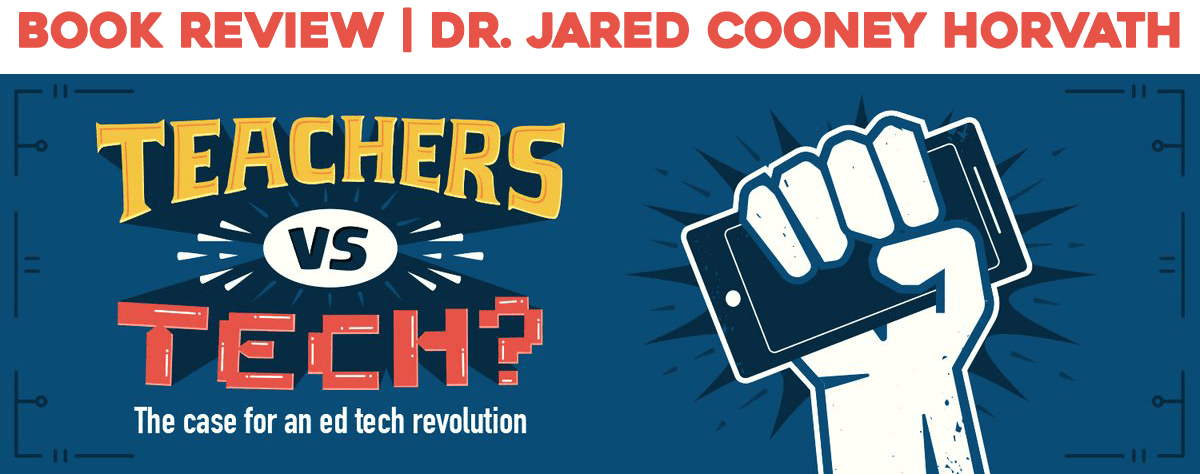

"A SOLID LOOK AT LEARNING ... BUT WHERE'S THE TECH?"
BOOK: Teachers vs Tech? | A Case for an Ed Tech Revolution
AUTHOR: Daisy Christodoulou
PUBLISHER: Oxford University Press
PUBLISH DATE: March 5, 2020
LENGTH: 232 pp
ISBN: 978-1382004121
There’s a scene from an early episode of The Simpsons where, after watching the film Naked Lunch, Nelson turns to Bart and bemoans, “I can think of at least two things wrong with that title”.
After reading this book, I had a very similar reaction.
Before tucking in, I’d like to make it abundantly clear that I am a huge fan of Daisy Christodoulou. I can’t begin to count how many times I’ve recommended her first book Seven Myths About Education … and if you’ve not yet watched the YouTube video of Daisy debating the topic of how Google is impacting our broader intelligence, you’re missing out. She’s an incredible thinker with a wealth of knowledge and an important message.
For those reasons, it’s difficult to report that Teachers vs Tech is a bit of a misstep.
With the subtitle ‘The Case for an Ed Tech Revolution’, one would reasonably expect a convincing argument outlining where education is failing, how things have gone awry, and why computers are the solution to these ills. As Daisy rightly points out in the introduction, history is a veritable graveyard of technologies that have tried and failed to revolutionize education (radio, television, interactive whiteboards, etc.). With these failures, why should we expect computers to be any different?

Unfortunately, no such argument is forthcoming. In fact, Daisy moves on from the introduction without ever making it clear what the crux of her argument even is. And, without a clear and convincing thesis at the outset, this book too often feels unfocused and meandering.
For instance, Chapter 3 opens by looking at the impact of external access to facts, moves onto a discussion about multi-media learning principles, and wraps up with a nod to the popular education/employment debate. In isolation, these topics are interesting, and Daisy does a great job of covering them – but together there is little coherence, and the reader is left wondering where the book is going (and why).
Which leads to my primary issue with this book: it’s not really about technology. In fact, aside from a brief and seemingly obligatory mention of computers at the start and end of each chapter, meaningful discussions about technology do not truly appear until about two-thirds of the way through the book.
In truth, Teachers vs Tech is about how human beings learn.
To be fair, Daisy does a wonderful job outlining key learning principles. Unfortunately, readers drawn to this book will undoubtedly be looking for answers concerning the promised EdTech revolution – and I worry they will be frustrated by the lack of useful insight on this issue.
When Daisy does turn her focus to technology, her discussions are regrettably cursory, and her penchant for drawing upon academic research strangely disappears. For instance, after devoting three pages to exploring the principle of distributed practice (along with eight research citations that support her topic), she closes with a surprisingly-brief two paragraph comment about how some computer programs have adapted this principle.
To compound the problem, beyond a user’s manual and an unpublished modelling paper, these two paragraphs contain no references demonstrating efficacy. It’s one thing to highlight how a computer program has integrated the science of learning, but it’s quite another to show how students can (and will) meaningfully learn from that program. And, whereas the former is interesting, I worry that readers of this book will be looking for answers to the latter – and those answers are largely absent.

In the book’s conclusion, Daisy wraps-up by arguing that computers have the potential to revolutionize education as long as they draw upon foundational human-learning principles. Although undoubtedly correct, this conclusion ultimately feels empty. The fact that computers can integrate learning principles is noteworthy ... but it doesn’t address the question of why we even need computers to propel education to greater heights.
What is gained or lost by using computers to support learning strategies that good teachers have been effectively leveraging for millennia? Surely this is what’s at stake when making the case for an EdTech revolution. Unfortunately, focusing on how to use emerging technologies does little to convince readers that computers are special and somehow immune from suffering the same fate as radio, television and interactive whiteboards.
Overall, as a book about learning, Teachers vs Tech is well argued and definitely enjoyable. But, as a book about why/how we should integrate technology into the classroom, I feel it's lacking.
If you’re a luddite, there’s little here to change your mind. If you’re an apologist, there’s little here to help you convert others. And, if you’re ambivalent about EdTech (like myself), this book doesn’t cover the topic with enough rigor to really move the needle.
Rest assured, this book in no way changes my opinion about Daisy and the impact I believe she can have on education. Unfortunately, Teachers vs Tech didn’t resonate with me. It generally felt like an under-cooked digression from her broader thesis.
Nevertheless, I remain very optimistic about Daisy’s work, and I look forward to seeing how she continues to develop these ideas moving forward.

DID YOU ENJOY THIS BOOK REVIEW?
Help spread the word by sharing it with your peers and colleagues ...

Not on the list? Click below to join the LME Community ...
Connect With Us
Copyright © 2022 LME Global – 6119 North Scottsdale Road, Scottsdale, AZ, 85250 – (702) 970-6557
Copyright © 2022 LME Global
6119 N Scottsdale Rd, Scottsdale, AZ, 85250
(702) 970-6557
